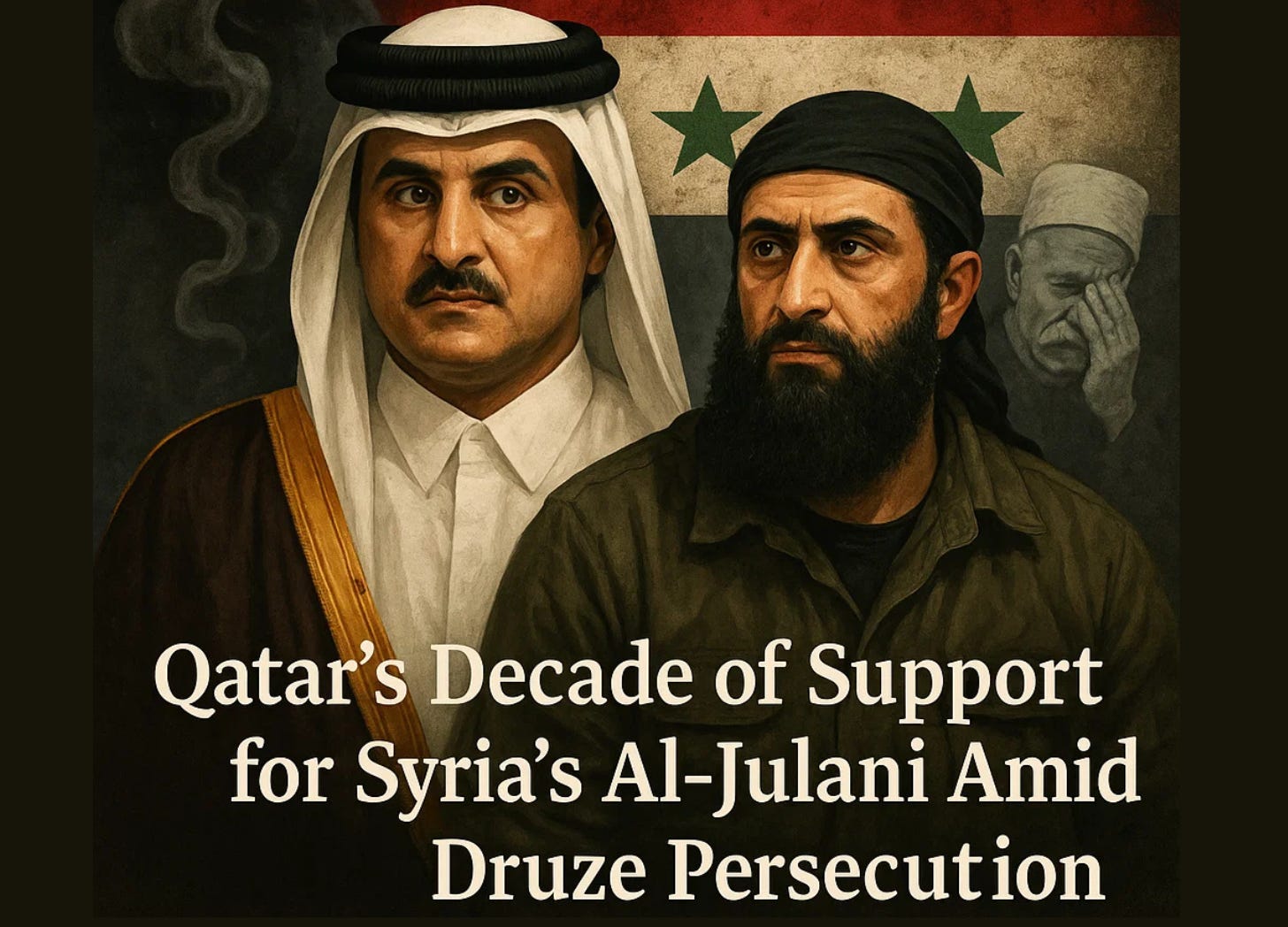Qatar's Decade of Support for Syria's Al-Julani Continues Amid Druze Persecution
Recent massacres of Druze in Sweida by Syrian regime forces raise questions about Qatar's decade-long investment in extremism in Syria
Sectarian violence against Syria's Druze minority has significantly intensified over the last 24 hours, raising questions about Qatar's strategic support for the country's new Islamist leadership under Ahmed al-Sharaa. As Syrian regime forces under al-Sharaa—the former al-Qaeda commander once known as Abu Mohammad al-Julani who now heads Syria—carry out what has been described as systematic acts of violence and executions of Druze civilians, Qatar's strategic investment in Syria's new Islamist leadership raises troubling questions about the consequences of supporting violent nonstate actors.
Current Violence Against the Druze
The violence currently ravaging the Druze-majority province of Sweida represents one of the gravest threats to religious minorities since al-Sharaa's Hayat Tahrir al-Sham (HTS) seized power in December 2024. According to the Syrian Observatory for Human Rights, more than 300 people have been killed in recent clashes, with reports of systematic “field executions” targeting Druze civilians.
Eyewitness accounts paint a disturbing picture of government forces entering sacred Druze community centers—known as madaafas—and executing civilians. Videos surfaced on social media showing "government-affiliated fighters forcibly shaving the mustaches of Druze sheikhs and stepping on Druze flags and pictures of religious clerics."
"We thought they came to stop the violence," one Sweida resident told The Media Line. "But then they started shooting indiscriminately. Madaafas were burned down, people were killed for no reason."
While the Syrian state has published statements condemning the violence and pledging accountability, these official condemnations stand in stark contrast to continued systematic attacks. Despite promises of accountability, prominent Druze leader Sheikh Hikmat Al-Hijri has characterized the Syrian government's actions as "a genocidal campaign against the Druze."
As of July 17, it was reported that Syrian government forces have withdrawn from the entirety of Sweida province following days of targeted violence against the Druze minority, according to war monitors and local witnesses. The withdrawal followed interim President Ahmed al-Sharaa's televised statement declaring that security responsibilities in Sweida would be transferred to local religious leaders and allied groups, citing "the supreme national interest." Whether this withdrawal will truly end the violence or simply create conditions for future conflict remains to be seen.
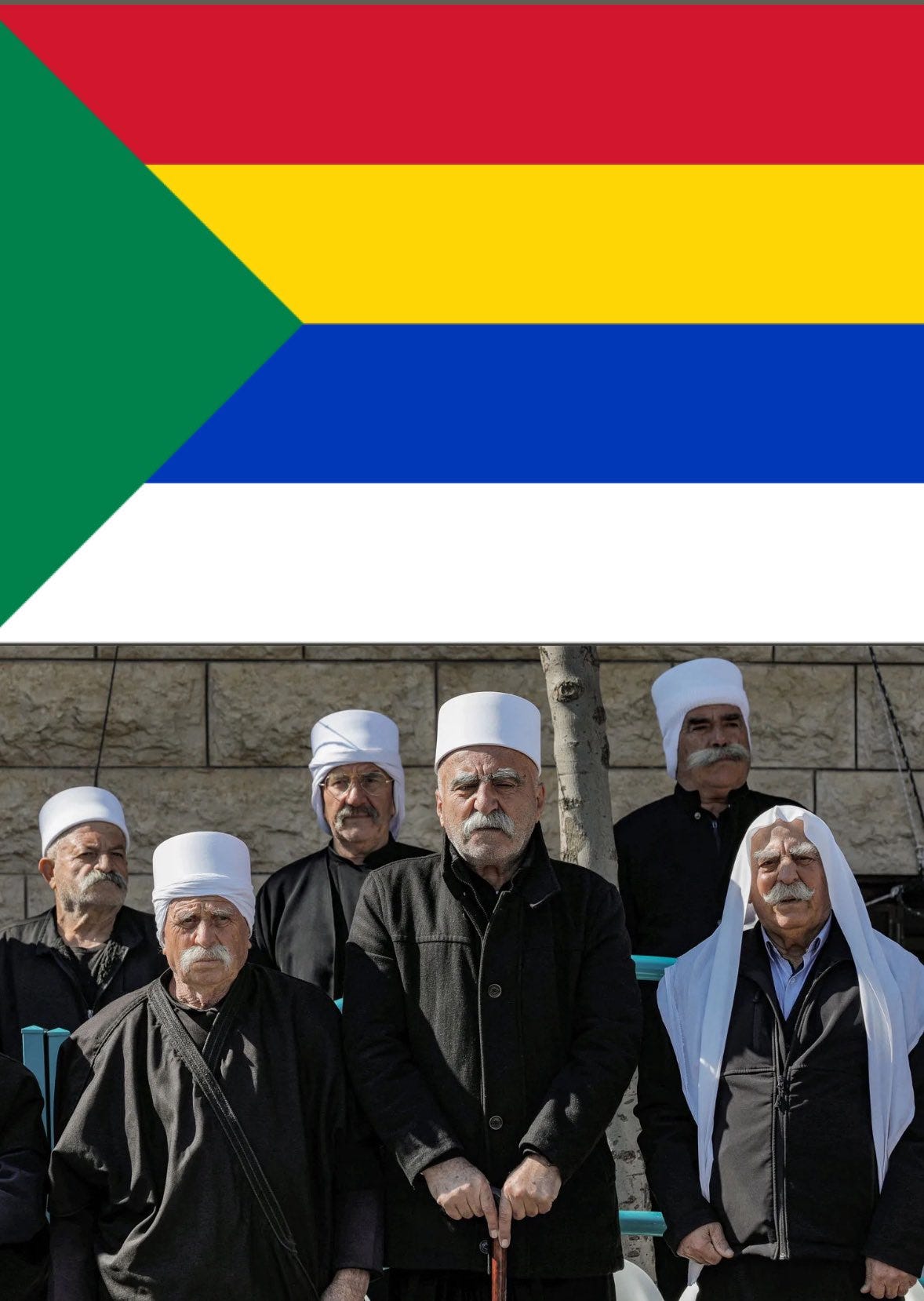
Qatar's Historical Investment in Al-Julani
Qatar's current relationship with al-Sharaa's regime cannot be understood without examining both al-Julani's extremist origins and Doha's documented history of supporting the groups he led. In 2011, ISIS leader Abu Bakr al-Baghdadi authorized Abu Mohammad al-Julani to establish a faction in Syria with financial backing. This group, known as Jabhat al-Nusra, emerged in early 2012 as a prominent force in the Syrian civil war. Initially aligned with al-Qaeda, al-Nusra later distanced itself from ISIS after Baghdadi attempted to merge the groups in 2013, leading to a rift between the two organizations
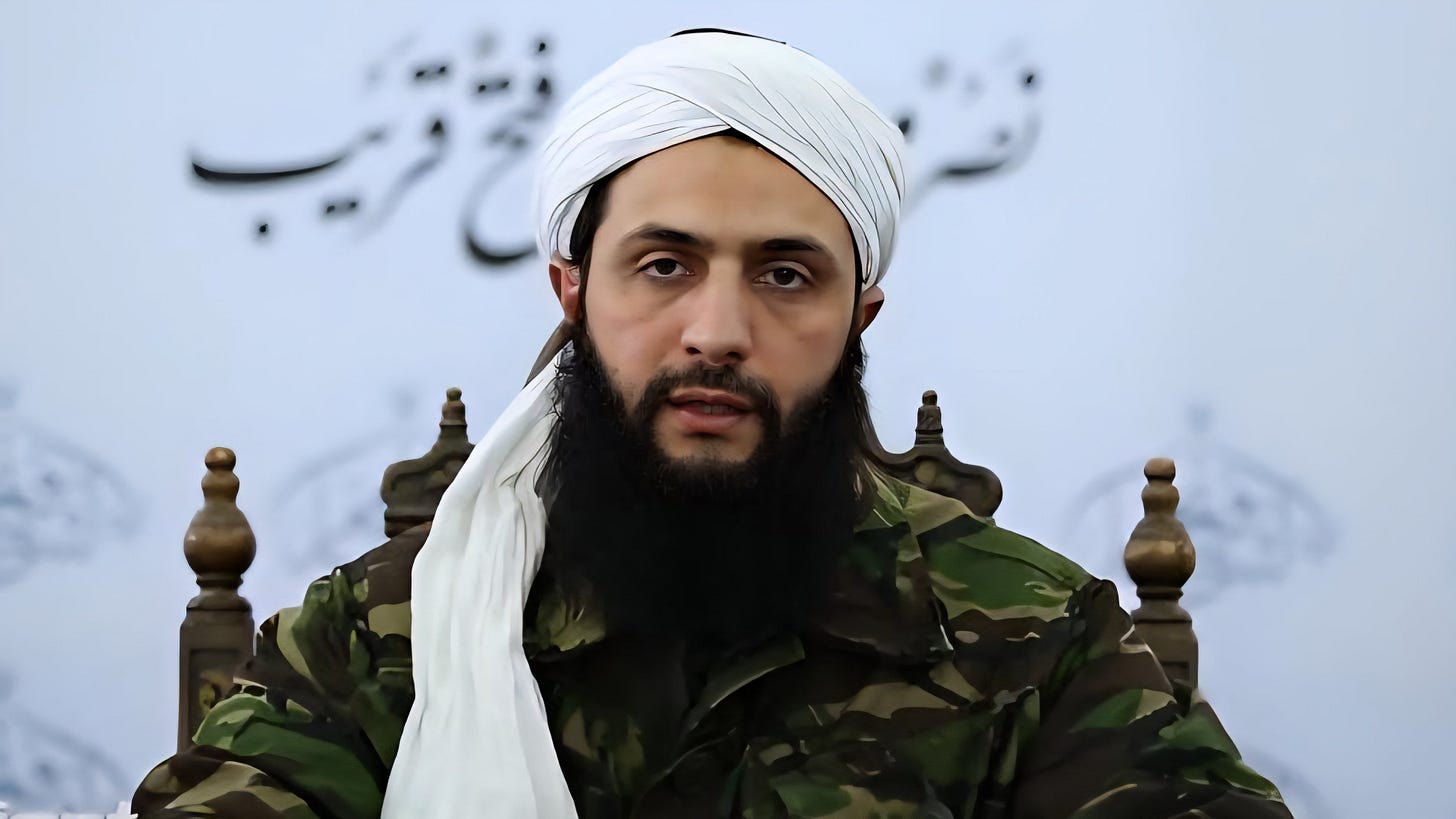
It was during this period that Qatar began its documented support for the extremist groups that have now consolidated power in Syria. A 2016 U.S. Defense Intelligence Agency report suggested that the al-Nusra Front "probably received logistical, financial, and material assistance from elements of the Turkish and Qatari governments."
The evidence of Qatar's financial connections to al-Nusra Front and its successor HTS spans nearly a decade. Intelligence specialist Steven Merley detailed how al-Nusra commanders visited Doha between 2012 and 2015 for meetings with Qatari military officials and financiers. Qatar also tolerated private terrorist financiers within its borders, many designated by the U.S., EU, and UN, who used charitable organizations to funnel millions of dollars to al-Nusra.
A 2020 Times report alleged that Qatar funneled millions to al-Nusra through ransom payments and charities, including a $1 billion deal in 2017 to secure the release of Qatari royal family members—money that bolstered al-Nusra's resources.
While Qatari officials have denied direct connections to al-Nusra, former Qatari Prime Minister Hamad bin Jassim bin Jaber al-Thani admitted in 2017 that Qatar "maybe" supported al-Nusra Front during the early years of the Syrian conflict.
Al Jazeera, Qatar's state-funded media outlet, provided significant legitimacy to al-Julani through exclusive interviews in 2013 and 2015, marking his first televised appearances and providing crucial exposure during his rise to power as he distanced himself from his ISIS origins.
In fact, it was the Qataris who helped shape al-Julani’s public image in the first place. As Jonathan Schanzer, the Executive Director, explained, "The Qataris have done quite a bit to launder the image of both the Taliban and HTS. In fact, it was the Qataris that initially came up with the idea of renaming the Nusra Front to HTS as a means of changing their brand."
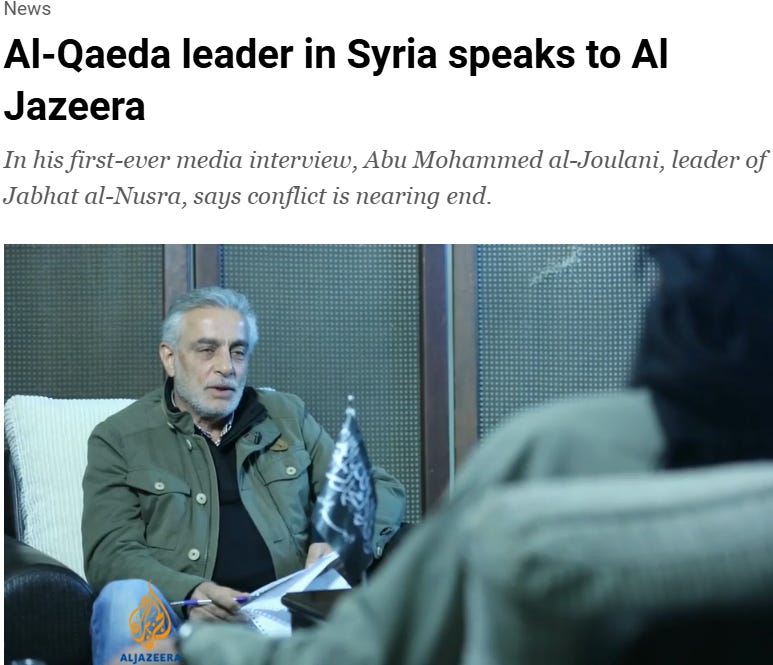
Current Strategic Relationship
Today, Qatar has emerged as one of the most enthusiastic supporters of al-Sharaa's government. Qatar's Emir Sheikh Tamim bin Hamad Al Thani became the first foreign leader to visit Syria post-Assad in January 2025, signaling Doha's strong commitment to the new administration.
Qatar has pledged concrete assistance to Syria's reconstruction, including funding for public-sector wage increases and support for Damascus International Airport operations. The Gulf state is also working with Turkey to provide floating power plants to Syria.
"All things considered: who could pay the cost of fuel and food for tens of thousands of HTS fighters?" asked regional expert Haitham El-Zobaidi in The Arab Weekly, highlighting Qatar's crucial financial role in enabling al-Julani's rise to power.
Pattern of Minority Targeting
The current Druze persecution follows a disturbing pattern under al-Sharaa's rule.
In April 2025, multiple days of deadly sectarian confrontations near Damascus resulted in at least 13 fatalities, according to state media and monitoring organizations, marking the second consecutive day of violence specifically directed at Syria's Druze religious minority. These attacks included reports of field executions and torture that would later escalate into the broader Sweida crisis.
The April violence against the Druze was preceded by even deadlier sectarian attacks in March 2025. In the Damascus suburb of Jaramana, violent unrest specifically targeted members of the Alawite minority community. The Syrian Observatory for Human Rights documented that more than 1,500 people, predominantly Alawite civilians, were killed during March by forces affiliated with Syria's interior, defense, and auxiliary services.
The Druze community, which maintained relative neutrality throughout Syria's civil war, now faces sectarian persecution by pro-regime forces under a government that Qatar has enthusiastically embraced and supported since al-Julani's rise to power.
International Response
The current Druze persecution follows a disturbing pattern of sectarian violence that has emerged under al-Sharaa's rule.
The international community has expressed growing concern about the escalating violence. U.S. Secretary of State Marco Rubio said Washington is "very concerned" about the violence and has been working to de-escalate tensions and promote dialogue.
Israel has taken direct military action to protect the Druze minority, launching airstrikes against Syrian regime forces. On July 16, 2025, Qatar published a statement condemning Israel for these strikes, highlighting the awkward position Doha now finds itself in—criticizing the protection of a minority group while simultaneously supporting the regime forces accused of persecuting them.
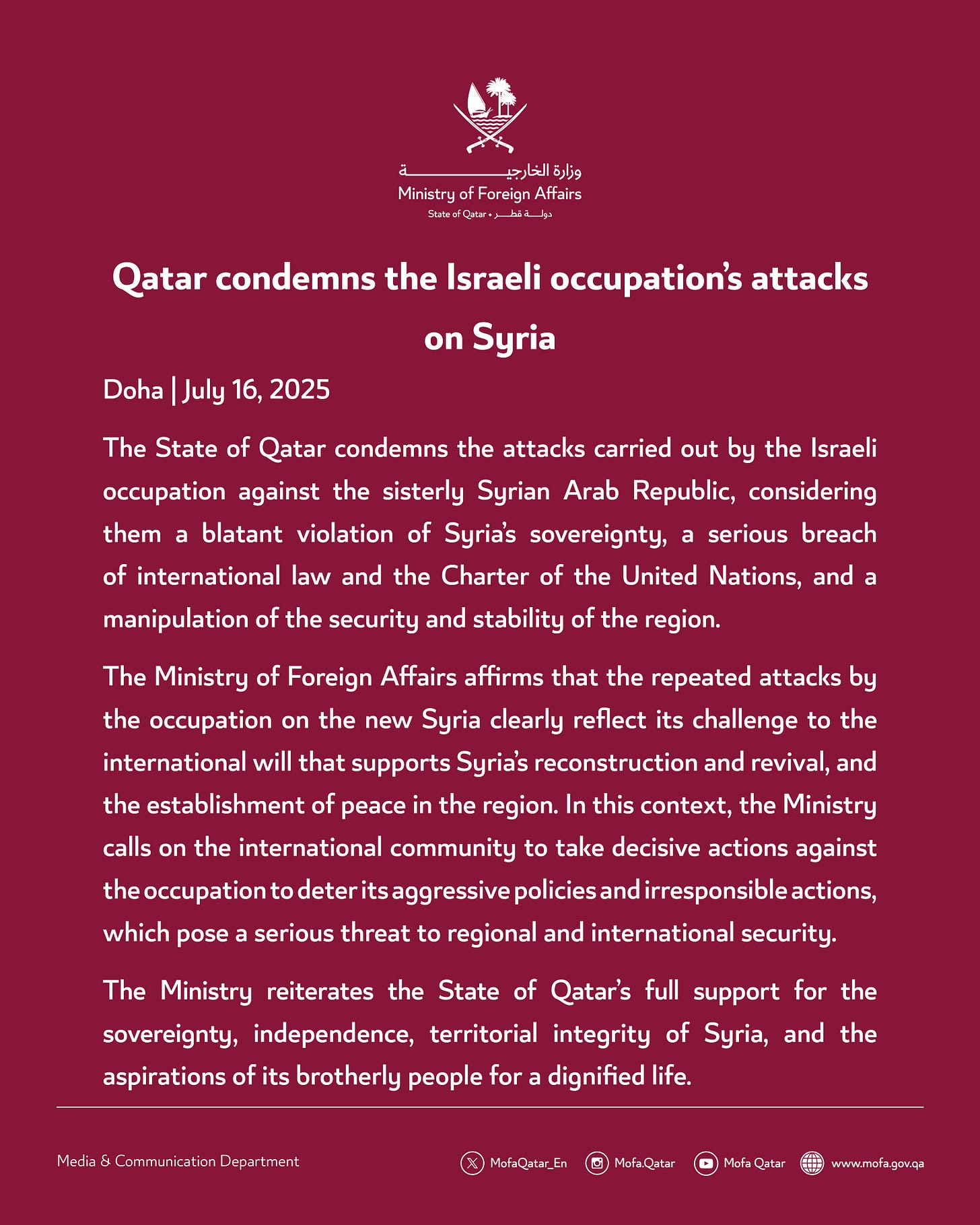
The Price of Backing Extremists
As Druze communities face systematic persecution despite official Syrian government condemnations, Qatar's decade-long investment in al-Julani's forces has yielded troubling results. While Qatar's historical support aimed at overthrowing Assad rather than enabling minority persecution, the current violence raises fundamental questions about the long-term consequences of empowering extremist groups.
The disconnect between Damascus's official statements and continued sectarian attacks suggests deeper governance failures within the Syrian state that Qatar now enthusiastically supports. The ongoing Druze persecution serves as a stark reminder that strategic investments in extremist movements can produce far-reaching consequences that extend well beyond their original objectives.



